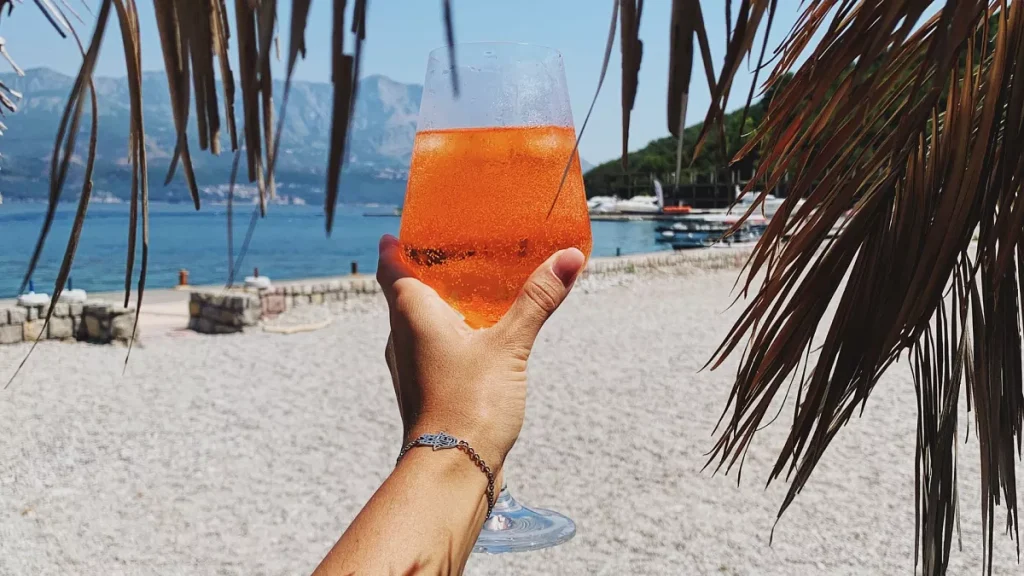St. Louis, Missouri – Not far from the Anheuser-Busch brewery, in one of the city’s oldest bars, Joshua Grigaitis fills a cooler with bottles and cans.

It’s Saturday night, and the lights are dim. Frank Sinatra’s raspy voice fills the air, along with the scent of incense. The place has all the ingredients: it’s frequented and by heavy drinkers.
Except for alcohol
Pop’s Blue Moon bar, a fixture of this beer-loving city since 1908, has joined a growing national trend: alcohol-free spaces that offer socializing without peer pressure to drink, hangovers, or DUIs. From booze-free bars to drug-free zones at concerts marked with yellow balloons, sober spaces are popping up across the country in reaction to America’s alcohol-soaked culture, promising a healthy alternative for people in recovery and those who simply want to drink less.
“We evolved as social creatures. This is a good tendency if you want the experience of having companionship and the social culture, but you don’t want the negative aspects,” said William Stoops, a professor at the University of Kentucky who studies drug and alcohol addiction. “It can help people make better decisions.”
A federal survey reveals that nearly 67 million Americans drink heavily at least once a month, meaning women have four drinks on a single occasion, and men five. Midwestern states have some of the highest rates of binge drinking in terms of prevalence and intensity, putting millions of people at risk.
Research links excessive alcohol consumption to fatty liver, cirrhosis, and cancers of the breast, liver, colon, mouth, and throat, as well as heart disease, high blood pressure, stroke, dementia, anxiety, and depression. Nearly half of all murders involve alcohol, according to studies. Alcohol use kills about 88,000 people a year, according to the Institute for Health Metrics and Evaluation at the University of Washington. These diseases and social ills cost the country an estimated $249 billion a year.
Even one drink a day is not healthy, said Dr. Sarah Hartz, an assistant professor of psychiatry at Washington University in St. Louis. “If you’re going to drink, you should know that it’s not good for you.”
For Grigaitis, 41, who co-owns the bar, tying all his fortunes to alcohol was “a heavy burden on my soul” after 20 years in the business. He limited his drinking and began hosting alcohol-free Saturday nights in January, offering hot water (an ingredient in beer), non-alcoholic beer, and drinks infused with cannabis-derived CBD.
I love everything about the bar business except the alcohol,” he said. “The non-alcoholic beverage movement is a growing group. I’m choosing it and I’m proud.”
Chris Marshall, who founded Sans Bar in Austin, Texas, in 2015, has been sober since 2007 and was working as a counselor when a client shared how difficult it was to navigate the social world without alcohol. The client’s relapse and subsequent death was a call to action.
Sans Bar went on a national tour this year with events in St. Louis, Portland, Oregon, and Anchorage, Alaska, and opened a permanent location in Austin. It draws a mostly female crowd across the sobriety spectrum, from those in recovery to the “sober curious.” People gather for hours to sip non-alcoholic craft cocktails, chat, dance, and listen to sober speakers and musicians.
“If you close your eyes on a Friday night, you’d think you were at a normal bar,” he said. “It’s not about being sober forever. It’s about being sober for the night.”
Alcohol is a perverse decoration of everyday life
Alcohol has become so ubiquitous that it’s perfectly acceptable to wear T-shirts that announce, “Mommy Needs a Glass of Wine” or “Daddy Needs a Beer.”
“It’s a ‘normal’ thing,” said Professor David Jernigan of Boston University’s School of Public Health. “It’s like the scenery of people’s lives.”
In Rock Hill, South Carolina, Liberty Tax served tequila when clients were filling out their taxes last April. The office of a dentist who treats adults and children hosts after-hours events that include wine. Neither of those businesses responded to requests for comment.
“Culturally, we know it’s not OK to hand out opioids when you’re washing your hair or your nails, but alcohol kills more people than opioids and businesses serve it,” said Alexandra Greenawalt, prevention director at the nonprofit Keystone Substance Abuse Services in Rock Hill.
Washington, D.C., has 2,055 businesses that sell alcohol — one for every 315 people — which Jernigan said is high. Some low-income, mostly African-American neighborhoods have very few stores other than liquor stores and markets that sell beer and wine.
Lothorio Ross, 38, started drinking around age 17 while on a fishing trip with his father. Now homeless in D.C. and confronting his alcoholism, he said he can get alcohol on credit at some liquor stores. But he said he is trying to kick the addiction, with the help of the nonprofit Father McKenna Center and by reminding himself of what life used to be like.
“Until I started drinking in my teens, I was having fun,” Ross said. “You can have fun without drinking; it’s possible.”